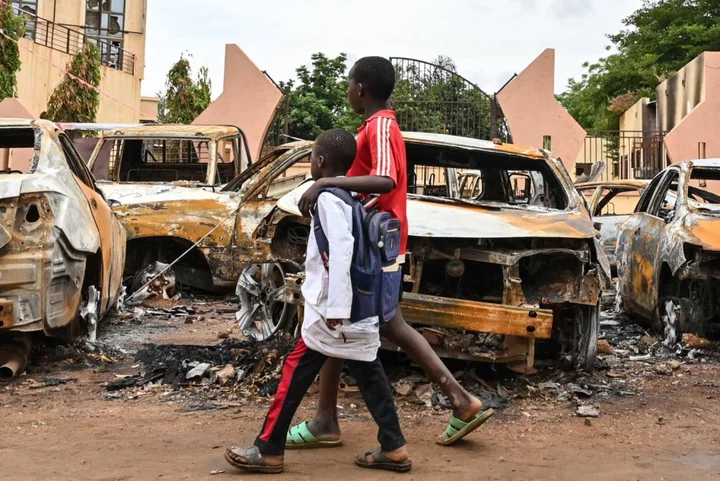Niger’s junta moved to consolidate power as regional leaders prepared for a second emergency summit since the country’s July 26 coup.
The soldiers now running Niger continued to ignore demands to relinquish power and began announcing a new cabinet, days after the expiration of a deadline imposed by its neighbors to restore democracy. West African heads of state are due to meet in Abuja, the capital of neighboring Nigeria, on Aug. 10 to discuss Niger, where President Mohamed Bazoum was deposed two weeks ago.
US Secretary of State Antony Blinken said on Tuesday that America backs regional efforts to bring a diplomatic resolution to the “extremely troubling” situation in Niger, a key ally in the global fight against jihadists in the western Sahel. His top deputy, acting Deputy Secretary of State Victoria Nuland, traveled to the capital, Niamey, on Monday for what she described as “difficult talks” with junta officials about reinstating Bazoum.
“We are supporting the efforts of” regional leaders “to restore constitutional order in Niger,” Blinken said in an interview Tuesday with Radio France Internationale. The coup “puts us and many other countries in a position where we have to stop our aid, our support, and this will not benefit the people of Niger.”
Leaders of the Economic Community of West African States regional bloc gave Niger’s military leaders until Aug. 6 to hand back power to Bazoum or face the potential threat of military intervention. The junta restricted access to the country’s airspace over the weekend, and postponed a visit by an Ecowas mediation delegation scheduled for Tuesday, according to a letter dated Monday.
The coup in Niger is the sixth in West Africa over the past three years. Ecowas didn’t threaten to use force to reverse any of the others, and Mali, Guinea and Burkina Faso are today under military rule, with their leaders dragging their feet to return power to civilians.
The bloc is likely to ultimately take a similar tack in Niger, Vladimir Antwi-Danzo, a security analyst and director of the Ghana Armed Forces Command and Staff College, said by phone from the capital, Accra.
“There’s the threat of a military intervention, but we don’t see any sign of troops preparing to deploy,” he said.
The 15-member bloc successfully intervened in Gambia in 2017 to help oust dictator Yahya Jammeh, who refused to step down after an electoral defeat. That time there was no violence — Senegalese troops advancing toward the capital, Banjul, were enough to make Jammeh change his mind.
Niger is more than 100 times the size of Gambia, and has close cultural and trade ties to neighboring Nigeria, which would have to lead any intervention given that it’s the region’s most influential country and has its biggest military. Senators and civil society groups from Nigeria’s north — which borders Niger — have already expressed their opposition to any intervention.
The junta has so far largely ignored the threat. Niger’s self-declared military leader Abdourahamane Tiani on Monday appointed Ali Lamine Zeine as prime minister, according to a statement read on state broadcaster Tele Sahel. Tiani didn’t meet Nuland, the second-ranking diplomat from the US, which has about 1,000 troops in the country.
(Updates with context throughout)

